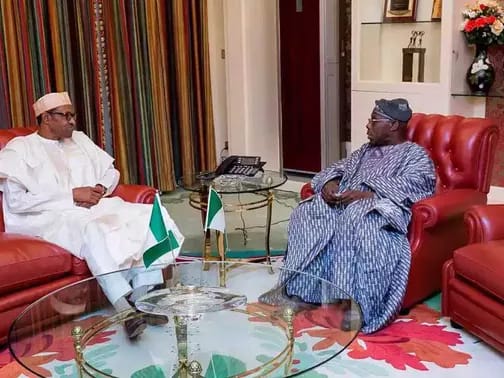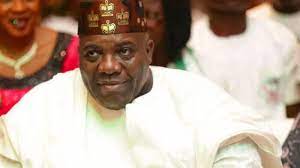By Emeka Alex Duru
Enlightened analysts had, long before now, predicted the on-going bull dog affair between President Muhammadu Buhari and his predecessor, Olusegun Obasanjo, even when they appeared to be in sizzling romance.
It was, in fact, for them, a matter of time for the two to go for each other’s throats. And their prediction is falling into place.
It was not that Obasanjo, had particularly preferred Buhari, for the highest office in the land, in 2015. It was rather, as he admitted, a matter of “any option but (President Goodluck) Jonathan” (aobj); an indication of not having any other choice at the time.
Coming from the same military constituency where both attained the rank of Generals and later, Heads of State at various times, they knew one another.
And for Obasanjo, who had supervised Buhari as his Federal Commissioner for Petroleum and Natural Resources while he was Head of State, he stood better to do a character sketch on the latter, especially his fragile temperament on the workings of democracy and rule of law.
But having fallen apart with the then President Goodluck Jonathan and not given to forgiving perceived offences, Obasanjo threw his weight behind Buhari, who was then, going for the presidency for the fourth time, after three unsuccessful attempts in the past.
At an encounter when he was confronted on his sudden support for Buhari, given his poor antecedents on human right issues, the former President, acknowledged that he, even, stood the risk of being sent to jail Buhari won the election but between the choice for his personal freedom under Jonathan and a better and corruption-free Nigeria under Buhari, he had to choose the latter.
Counting on Military Brotherhood
Even when Buhari was accused of not possessing the West African School Certificate (WASC), the minimum qualification for any political office in the land, Obasanjo promptly jumped to his defence, claiming that he could not have joined the officer cadre of the military at the time he did, without having a School Certificate.
“Buhari joined the Army about four years after me and if I needed such a certificate to be admitted into the Army, I don’t know how he could have avoided the subject”, Obasanjo argued.
He added that even if the President did not have the controversial Certificate, he went through a military academy, and staff college, where he earned an equivalence of a first degree, and a war college in America that could go for a master’s degree.
In his estimation, what was needed was addressing the issues at stake and not degenerating into the trivialities on academic qualification.
Buhari hits the road
That was a major endorsement the Buhari campaign team badly needed in going against Jonathan. Added to the pledge by the President to tackle insecurity, corruption, unemployment and boost the economy, it was not surprising that he won the election, the first of such feat by an opposition candidate against an incumbent, in Nigeria’s history.
Up to the second year of the Buhari administration, Obasanjo maintained the sizzling rapport with the President. On occasions when he had been asked to make assessment of the government’s performance profile, he had given it credit on the fight against corruption and insecurity, rating it low on economy and foreign relations, however.
But that was not to last indefinitely. At a time when the former President began to evade questions on activities of the administration, it became apparent that he had started incubating issues against the President.
The curtain falls
Matters however came to a head, early this year, January 23, 2018, when Obasanjo, in a scathing memo, asked Buhari not to seek re-election in 2019, accusing him of nepotism and exhibiting poor knowledge of governance in a complex system as Nigeria.
While admitting complicity in enthroning Buhari who “is weak in the knowledge and understanding of the economy”, he said he had thought that the President could make “use of good Nigerians in that area”.
But to his regret, Buhari has turned out a colossal failure, touting the oft-vaunted war against Boko Haram insurgents and corruption as the only achievements of his administration.
Obasanjo also accused Buhari of engaging in actions that have further divided the country and not taking responsibilities that his office demands.
He consequently advised the President not to seek re-election, next year. “I only appeal to brother Buhari to consider a deserved rest at this point in time and at this age”.
Buhari, in replying the letter, through the Information Minister, Lai Mohammed, chose to advertise the achievements of his administration in areas of security, economy and infrastructure uplift. But it was obvious that the two erstwhile military dictators, had fallen apart.
Eyeball to eyeball
When therefore the President made a formal declaration of his interest to his All Progressives Congress (APC) special National Executive Committee (NEC) meeting, on Monday, April 9, 2018, it was apparent that the two were clearly headed for collision.
Perhaps, more than any other consideration, what seems to have prepared the stage for the impending battle, was a nebulous publication on the internet which suggested that Obasanjo had made a rethink in his opposition to the President’s re-election agenda and had decided to support him.
But with characteristic seething rage, the former President put a lie to the publication, stressing that if anything, his mind had been made in going against the President on the issue.
“My mind is made up about kicking Buhari out”, he was quoted to have threatened during the week. The battle line is thus drawn, analysts conclude.
Buhari steps into the ring
Apparently prepared for the battle eventually, the President threw his own punches on his predecessor on Tuesday, May 23, when he made allusions to some money claimed to have been spent in power reforms, without much to show for the expenditure.
While holding court with Buhari Support Group (BSG) led by the Comptroller General of Customs, Hameed Ali, in Aso Rock villa, Buhari had reportedly remarked; “One of the former Heads of State (referring to Obasanjo) was bragging that he spent more than 16 billion USD on power in Nigeria. Where is the power?’’
That was the first time that, Buhari would throw a direct jab at his former boss, since the cold war began, indicating that he had fully stepped into the ring.
Incidentally, Obasanjo who would not allow the remark go unchallenged, promptly responded via a statement by his media aide.
“We recommend that the President and his co-travellers should read Chapters 41, 42, 43 and 47 of My Watch for Chief Obasanjo’s insights and perspectives on the power sector and indeed what transpired when the allegation of $16 billion on power projects was previously made”, the statement stressed.
A tab on Obasanjo?
Given the undisguised tendencies of the Buhari administration in focusing its anti-corruption drive against perceived opponents, there are insinuations that Obasanjo may be reined in by the Economic and Financial Crimes Commission (EFCC), in the days ahead.
But the former President does not seem bothered. He has even expressed readiness to offer himself for probe on the matter. The die, many suggest, is thus cast.
The Generals, the antecedents
For Obasanjo, who boasts of not losing in any engagement he has embarked on since birth, this may perhaps be the toughest battle of his life. Known for stubborn disposition and uncommon resolve in going about a chosen cause, there is nothing to suggest that he would back down this time around.
As if in readiness for the rough road ahead, he has alerted his colleagues in the Buhari must go agenda, to be prepared for possible onslaught from agents of state in the days ahead.
The sudden resurrection of the power reform expenditure by the President, may fall into this permutation.
The last time Obasanjo had encountered such challenge was during the regime of late General Sani Abacha.
Before Abacha, he was known to have provided the most stunning criticism to the General Ibrahim Babangida administration (1985 – 1993), at a time, even, mocking the Military President, to inject human face to the government’s economic recovery initiative, tagged Structural Adjustment Programme (SAP).
Officials of the regime, had on such occasions, dared him. But Obasanjo had maintained his stance. Babangida eventually stepped out of office following the outrage that trailed his annulment of the June 12, 1993 presidential election, presumed to have been won by late MKO Abiola.
The succeeding Abacha government, did not escape Obasanjo’s acerbic criticism, particularly, over its poor human rights records.
His disagreement with the regime came to a head when he was roped into what later turned out a phantom coup, in 1995, which led to his imprisonment.
Obasanjo was released from jail following Abacha’s controversial death in 1998. It was after the deadly encounter that he was packaged for the presidency.
The former President regards his experience under Abacha as the lowest point in his life, adding that he does not fear death, again, having seen it all.
That unyielding disposition is what he seems to have resurrected in the current efforts at stopping Buhari.
The President, incidentally, is also not known to be battle-shy, especially on issues that are perceived to bear on his ego.
Even with his tribe of supporters continuously dwindling, especially in the South and the Middle Belt on account of the narrow and provincial outlook of his administration in terms of policies and appointments as well as his fragile health, he is bent on having another shot at the office.
With a determined mindset that saw him gunning for the position for 12 years – since 2003- before making it in 2015, it is not likely that he will let go without a strong push.
What more, he is increasingly pushing into his northern enclave, for the support of the largely neglected and uneducated rural voters, who literally see him in the mould of a Saint.
Enlightened observers, thus, see in the days ahead, tough talks from foot soldiers of the two generals, warning however, that the envisaged banters, do not overheat the polity.













